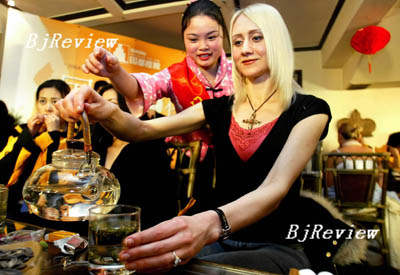|

Walking into the warm den of The Tea Spot, in the heart of New York's Greenwich Village, entering students from nearby New York University are greeted with a blast of sweet, grassy scents that erases winter's chill. A wall of canisters stretching from floor to ceiling sits behind the counter, with names such as "Madagascar Bourbon Vanilla" and "Gunpowder" emblazoned on them.
Store manager Alice Seurattan offers up a sample of an Oolong blend, and says Chinese-blend teas comprise about 20 percent of the store's available teas.
"Customers like them. They like to try something different and have something sweet," Seurattan said, adding customer favorites include Gunpowder, a green tea blend rolled into tiny leaf balls that unfold in the tea pot, Anxi Select and Chun Mei.
Teashops like The Tea Spot are transforming New York City, once a bastion of coffee drinkers. Coffee is America's iconic and favorite hot beverage. It's known as "a cup of Joe," "brain juice," "java" and the "daily grind." Pictures of hardworking, grizzled New Yorkers loading up on a cup of caffeine before starting their blue-collar jobs have been with us for decades.
Times are changing, it seems.
"Coffee is overrated," wrote one Tea Spot fan on an Internet message board. "For all of those non-coffee drinkers, like me, out there this is a great alternative to the standard coffee shop."
"If I'm really in the mood for some jasmine tea from the northwest corner of Mongolia, I'll go here," wrote another.
China has been cultivating tea for more than 5,000 years and has more than 3,000 blends. China became the world's largest tea exporter by tonnage in 2006, thanks to increased exports balancing out lower demand within the country. As Chinese find a taste for soft drinks and coffee, other markets around the globe are showing a greater thirst for tea. China was the first country to cross the 1 billion kg mark for tea exports and 70 percent of tea exports from the country are green tea varieties. According to foodqs.com, one of leading portal websites on food industry in China, China's tea export to the United States during January to November in 2007 totaled 18,100 tons, worth $36.51 million.
It's easy to see the trend in New York City. At Passage: The Tea Gallery in the Lower East Side neighborhood of the city, customers can participate in a Puer (large leafed earthy flavored Chinese tea) tasting group and order up an entire Chinese tea ceremony.
One of the largest producers of Chinese teas has a shop in New York, in Chinatown along Mott St. The Ten Ren Tea Time store has a shop next door where customers can try famous blends of Chinese teas and bubble teas.
Local tour operator Vee Tea offers several "tea tours" around Manhattan, including a two-hour Chinese tea ceremony for $200 per person and a three-hour tour of teashops in Chinatown for $80 per person.
"My goal is to spread joy for and knowledge about tea, one small group at a time," wrote owner Lindsey Goodwin on her website.
The joy and knowledge seem to be spreading, as new teashops spring up around the city and old favorites find a new audience among younger patrons.
"A new wave of tea drinkers has emerged. Young and hip, this new crowd has a high demand for exotic spiced teas, fruit-infused choices, and tapioca bubble teas," said tourism officials from NYC & Company in a statement.
The wave of tea popularity is showing up in other cities as well. Seattle, the heart of America's coffee addiction, is proving a fertile ground for tea lovers as well, according to an article in the Seattle Times.
"There's been a resurgence in tea as an alternative to coffee," Julee Rosanoff, co-owner of Perennial Tea Room in Pike Place Market, told the Seattle Times. "Tea is a gentler drink, and we have access to a wider variety of tea. When I was growing up, the only tea we had was Lipton."
Tea is considered a healthier alternative to coffee in the U.S., which is the reason for much of its increased popularity. Tea has anti-cancer properties, increases the body's metabolic rate, has possible anti-diabetic effects, boosts mental capacity and awareness, lowers stress and even boosts your immune system.
In another article from the Seattle Times, James Norwood Pratt, tea expert and author of New Tea Lover's Treasury said, "The health factor has had a huge impact on sales in this country. Americans will do anything if you tell them it's healthy." | 